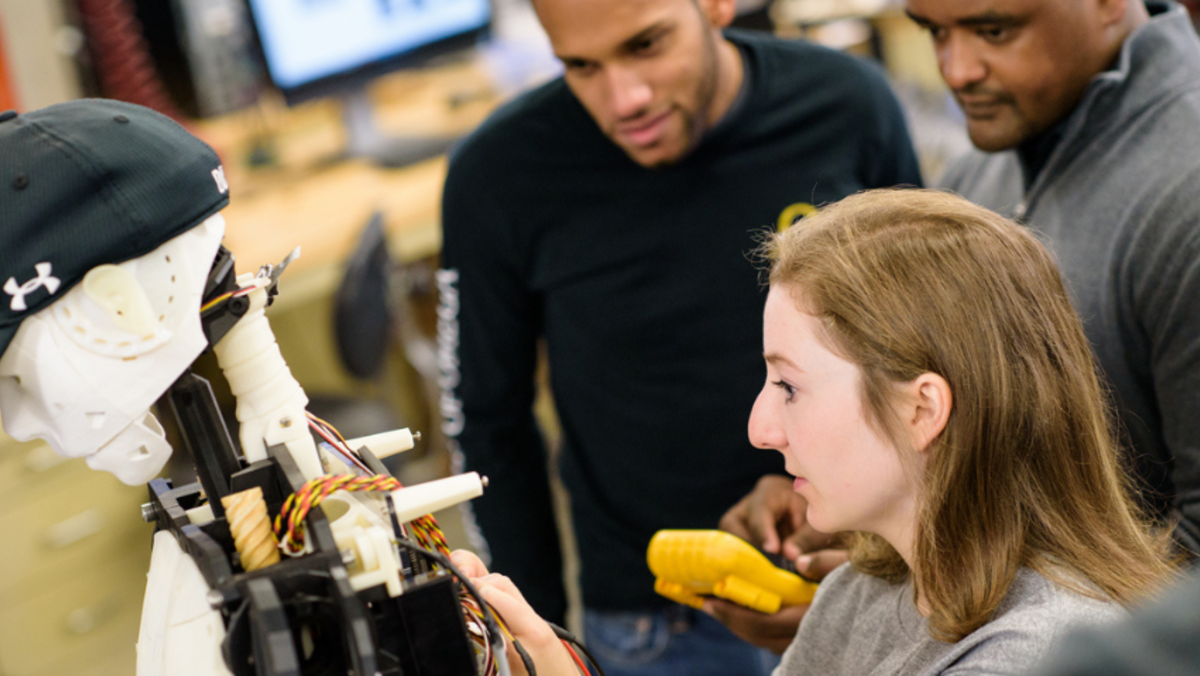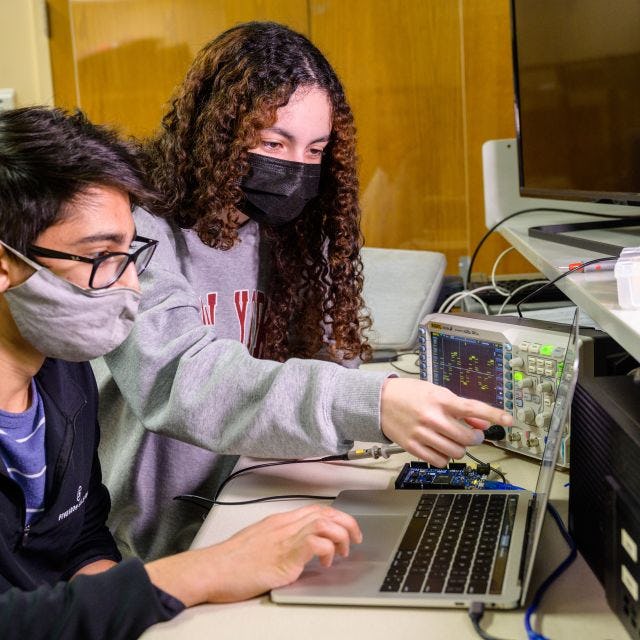
Bachelor's Degree in Electrical Engineering
Program Details
Degree
Bachelor of EngineeringDepartment
Electrical and Computer EngineeringAvailable
On campusThe electrical engineering bachelor’s program at Stevens trains you with the tools and skills you need to understand and apply today’s technologies and develop the technologies of tomorrow.
Telecommunications, data networks, signal processing, digital systems, embedded computing, intelligent systems, and electronics are just a few of the exciting and rapidly evolving areas of electrical engineering that dominate today's technology-driven world. As the power and sophistication of information technology grows exponentially, electrical engineers with digital expertise are essential to commerce, government, industry, and everyday tech gadgets like smart phones and gaming systems.
The electrical engineering undergraduate program at Stevens offers you a foundation in fundamental engineering and the liberal arts, while focusing on the deep disciplinary knowledge needed to succeed in the electrical industry, and beyond. As an undergraduate, you have access to state-of-the-art academic and research laboratories where students can create unique parts for their electronic designs, including circuit boards, enclosures and other parts.
A thorough, broad-based curriculum with strong technical courses taught by globally renowned faculty facilitates the integration of science, technology, and business skills. The program culminates with a project-oriented, two-semester senior design course where you'll develop the entrepreneurial and project management skills needed to become a future technology leader.
Concentrations
Artificial Intelligence
Computer Architecture
Data Engineering
Electronics and Embedded Systems
Image Processing and Multimedia
Networks and Security
Power Engineering
Robotics and Control
Software Engineering and Design
Wireless Communications
The Stevens Advantage: Hands-On Learning, Real World Experience
At Stevens, you’ll learn to think like an engineer. Our design-focused curriculum features a hands-on course every semester that will instill you with broad, foundational knowledge, the complete fundamentals of engineering, and entrepreneurial thinking. Learn more about what makes an engineering education from Stevens a unique experience:
The Design Spine: a unique, design-focused, hands-on course every semester that incorporates entrepreneurial thinking and experiential learning, culminating with Senior Design, a team capstone project working on prototypes for real business problems, potentially in collaboration with a real company
Innovation Expo: an exciting design and entrepreneurship competition where students showcase their senior design prototypes and pitch business ideas
Engineering Cooperative Education Program: nearly 30% of all engineering students participate in Stevens’ Cooperative Education Program where you get on-the-job experience working for real companies
State-of-the-Art Research Labs and Facilities: build, tinker and test your designs in Stevens' MakerCenter, Prototype and Object Fabrication Lab, or numerous other research facilities
Undergraduate Research Opportunities: our research-oriented curriculum gives you in-the-lab experience while you're still an undergraduate student
More opportunities for Stevens undergraduate students include:
Double count undergraduate course credits toward a graduate degree and earn your master's faster – in just five years through Stevens' Accelerated Master's Program >
See what it's like to be an electrical or computer engineer at Stevens by visiting the links below.
An ABET Accredited Program
The Bachelor of Engineering in Electrical Engineering program is accredited by the Engineering Accreditation Commission of ABET, https://www.abet.org, under the commission’s General Criteria and the Program Criteria for Electrical, Computer, Communications, Telecommunication(s) and Similarly Named Engineering Programs.
Mission
The mission of the undergraduate electrical engineering program in the Department of Electrical and Computer Engineering (ECE) is to provide a balanced education in fundamental principles, design methodologies, and practical experiences in electrical engineering and in general engineering topics through which graduates can enter into and sustain lifelong professional careers of innovation and creativity.
Program Educational Objectives
The overriding objective of the electrical engineering program is to provide graduates with the skills and understanding needed to design and build innovative new products and services which balance the rival requirements of competitive performance/cost and practical constraints imposed by available technologies.
Graduates of the Electrical Engineering program will:
Be recognized as innovative technical experts who demonstrate advanced understandings of the state-of-the-art in electrical engineering, as well as their professional, social and ethical responsibilities
Emerge as technical leaders through their own individual contributions and their abilities to work with and influence others
Function as effective entrepreneurs who nurture new technologies from concept to commercialization
Student Outcomes
By the time of graduation, electrical engineering students will attain:
an ability to identify, formulate, and solve complex engineering problems by applying principles of engineering, science, and mathematics
an ability to apply engineering design to produce solutions that meet specified needs with consideration of public health, safety, and welfare, as well as global, cultural, social, environmental, and economic factors
an ability to communicate effectively with a range of audiences
an ability to recognize ethical and professional responsibilities in engineering situations and make informed judgments, which must consider the impact of engineering solutions in global, economic, environmental, and societal contexts
an ability to function effectively on a team whose members together provide leadership, create a collaborative and inclusive environment, establish goals, plan tasks, and meet objectives
an ability to develop and conduct appropriate experimentation, analyze and interpret data, and use engineering judgment to draw conclusions
an ability to acquire and apply new knowledge as needed, using appropriate learning strategies
a fundamental knowledge and an appreciation of the technology and business processes necessary to nurture new technologies from concept to commercialization
Putting You on Track for Professional Success
The electrical engineering bachelor’s program develops in-demand knowledge and skills to put you on track for career success. Career opportunities include:
Electrical Engineer
Electronics Engineer
Power Engineer
Robotic Engineer
Telecommunication Engineer
Network Engineer
Electrical Engineer
Potential hiring organizations include companies like: Google, Facebook, Amazon, Microsoft, American Express, Verizon, Comcast, UBS, Booz Allen
A Tech Forward Education
Undergraduate Programs Facts & Statistics
Related Programs
Bachelor's Degree in Computer Engineering
The computer engineering bachelor’s program at Stevens teaches you the innovative problem-solving skills you need to become leaders in such fields as software development, data structures and algorithms, computer communications and graphics.
Bachelor's Degree in Computer Science
The computer science bachelor’s program at Stevens teaches the fundamental problem-solving skills you need to become the next innovator and technology leader.






